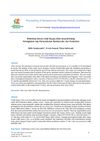34 citations,
January 2022 in “Molecules/Molecules online/Molecules annual” Natural ingredients in cosmeceuticals are beneficial for skin and hair health with few side effects.
 16 citations,
October 2023 in “Molecular cancer”
16 citations,
October 2023 in “Molecular cancer” New treatments like nanotechnology show promise in improving skin cancer therapy.
 9 citations,
December 2022 in “Antibiotics”
9 citations,
December 2022 in “Antibiotics” Coconut seed extract may effectively treat scabies in rabbits by killing mites and reducing inflammation.
 6 citations,
December 2022 in “Frontiers in Pharmacology”
6 citations,
December 2022 in “Frontiers in Pharmacology” Quercetin may help improve symptoms of polycystic ovary syndrome.
 5 citations,
October 2022 in “Cosmetics”
5 citations,
October 2022 in “Cosmetics” Cell-based models help test if cosmetic ingredients really work for hair growth and skin health.
 5 citations,
February 2022 in “Acta Biomaterialia”
5 citations,
February 2022 in “Acta Biomaterialia” Nanomaterials can improve hair care products and treatments, including hair loss and alopecia, by enhancing stability and safety, and allowing controlled release of compounds, but their safety in cosmetics needs more understanding.
 4 citations,
October 2022 in “Microbial Cell Factories”
4 citations,
October 2022 in “Microbial Cell Factories” Certain bacteria from the Citrullus colocynthis plant may be a new source of antibiotics to fight drug-resistant diseases.
2 citations,
February 2024 in “Pharmaceutics” Chitosan scaffolds with silver nanoparticles effectively treat infected wounds and promote faster healing.
 2 citations,
January 2023 in “Pharmaceuticals”
2 citations,
January 2023 in “Pharmaceuticals” Natural products and phytochemicals may help with hair regrowth, but more research is needed.
 1 citations,
March 2023 in “Phytochemistry Reviews”
1 citations,
March 2023 in “Phytochemistry Reviews” CBD may improve skin and hair health, but its effective use and safety need more research.
 1 citations,
November 2021 in “Jurnal Farmasi Indonesia”
1 citations,
November 2021 in “Jurnal Farmasi Indonesia” Secang wood extract hair tonic promotes hair growth and meets quality standards.
1 citations,
May 2019 in “International Journal of Applied Pharmaceutics” Both hair tonic and gel with Angiopteris evecta extract effectively stimulate hair growth.
February 2024 in “Cosmetics” The conclusion is that new plant-based treatments for hair loss may work by targeting certain enzymes.
 November 2023 in “Research journal of pharmacy and technology”
November 2023 in “Research journal of pharmacy and technology” Medicinal plants may effectively treat hair loss.

New treatments for hair loss should target eight main causes and use specific plant compounds and peptides for better results.

Plant-based compounds can improve wound dressings and skin medication delivery.
 June 2023 in “Research journal of topical and cosmetic sciences”
June 2023 in “Research journal of topical and cosmetic sciences” The polyherbal lotus oil with amla, hibiscus, bhringraj, and methi promotes hair growth effectively, similar to minoxidil.
 May 2023 in “Asian journal of research in pharmaceutical sciences”
May 2023 in “Asian journal of research in pharmaceutical sciences” Ketoconazole is effective for treating various fungal infections and has new uses in dermatology, but oral use can have serious side effects.
1 citations,
February 2024 in “Diversity” African plants can treat hair issues and may help with diabetes.
 June 2022 in “International Journal for Research in Applied Science and Engineering Technology”
June 2022 in “International Journal for Research in Applied Science and Engineering Technology” The herbal shampoo made from Piper Betel and Psidium Guajava leaves was safe, promoted hair growth, and reduced hair fall.
 February 2023 in “International Journal of Advanced Research in Science, Communication and Technology”
February 2023 in “International Journal of Advanced Research in Science, Communication and Technology” Herbal shampoos with Neem and Tulsi might be safer and more effective for controlling dandruff.
 March 2021 in “International journal for research in applied science and engineering technology”
March 2021 in “International journal for research in applied science and engineering technology” Herbal hair dyes from tannin-rich plants are effective and safer than synthetic dyes.
Aloe vera and celery extract in microemulsion form significantly improve hair growth.
 1 citations,
January 2022 in “Journal of Drug Delivery Science and Technology”
1 citations,
January 2022 in “Journal of Drug Delivery Science and Technology” A gel made with finasteride, garlic oil, and Aloe vera using nanotechnology can potentially treat hair loss more effectively.
 1 citations,
October 2019 in “Proceedings Mulawarman Pharmaceuticals Conference”
1 citations,
October 2019 in “Proceedings Mulawarman Pharmaceuticals Conference” Aloe vera serum helps hair growth but doesn't protect from the sun.
1 citations,
July 2017 in “Nusantara bioscience” Aloe vera and Spirulina improved rabbit skin appearance the most.
 July 2023 in “International journal of advanced research in medical and pharmaceutical sciences”
July 2023 in “International journal of advanced research in medical and pharmaceutical sciences” The gel combining minoxidil and Aloe vera could be an effective, non-irritating treatment for hair loss.
January 2021 in “Indonesian Journal on Medical Science” The hair tonic with aloe vera and celery was successfully made, with the first formula being the most stable.
Aloe vera hair tonic with 10% and 15% concentrations effectively promoted hair growth in male rats.
April 2016 in “Pharmaciana” A combination of Aloe vera and liquorice extracts promotes significant hair growth.



















